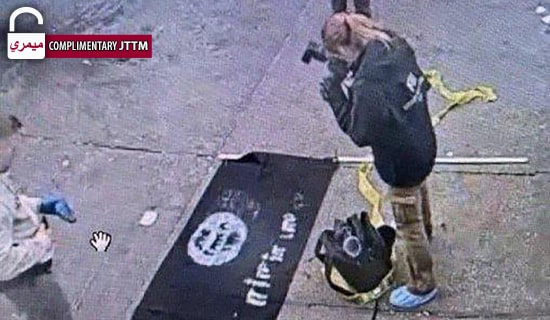On June 30, 2019, Senior Saudi journalist 'Abd Al-Rahman Al-Rashed wrote an article in response to the June 27, 2019 storming of the Bahraini embassy in Baghdad. The embassy compound was stormed by a crowd protesting Bahrain's hosting of the "Peace to Prosperity" workshop, which sought to lay an economic foundation for peace between Israel and the Palestinians. Al-Rashed, formerly the editor-in-chief of the London-based Saudi daily Al-Sharq Al-Awsat and currently the head of the editorial board of Saudi Arabia's Al-Arabiya TV and Al-Hadath TV, wrote that the incident was the result of Iranian propaganda, and was in fact part of a broad campaign by Iran to transform Iraq into an arena for fighting its opponents, including the U.S. and the Gulf states. He warned that this campaign, which undermines Iraq's sovereignty and stability and threatens to turn it into another Lebanon, can only be fought if Iraqis realize its existence as quickly as possible and stop their country from becoming "firewood in the upcoming war."
The following is Al-Rashed's article, as it appeared in the English-language Saudi daily Arab News:[1]

'Abd Al-Rahman Al-Rashed (Source: Alarabiya.net)
"The storming of the Bahraini Embassy in Al-Mansour in Baghdad, which is supposed to be one of the most guarded and secure neighborhoods in the city, is of great concern. The concern, in reality, is not for the Embassy of Bahrain or its interests, but rather for Baghdad and Iraq, and its sovereignty — both present and future.
"The Wall Street Journal has reported that a drone that recently attacked Saudi Arabia came from Iraq, and not from Yemen, as Iran and its Houthi proxies have claimed. This is added to a list of events that undermine the sovereignty of Iraq, and undermine respect for the decisions of the politicians who were chosen by the Iraqi people to lead it. The storming of the Embassy of Bahrain was not surprising for observers of Iranian propaganda, or in Baghdad itself, where a series of events preceded the storming, including a lecture intended to discredit and attack Bahrain, in which unfortunately Palestinian politicians participated.
"It is the right of Iraqis to object to the 'Peace to Prosperity' workshop in Manama, and to reject the concept of peace, though no political project was presented there and no one bought or sold anything. In addition, no Israeli official was present at the workshop, which was not the first of its kind in the region. However, we know that Iran wanted to launch a counterattack, or a rebound as football commentators say, as a reaction to being blockaded — a blockade that was itself a consequence of Iran’s threats to states of the region; Yemen, Syria, Palestine, Lebanon, and Iraq itself.
"Iraqi leaders are facing a clear-cut Iranian targeting of their state, its sovereignty and its resources. For the Tehran regime considers Iraq a soft territory, a country where it could resolve its battles with its opponents, the US, the Gulf states, and also the European states at a later stage. It will transform Iraq into another Lebanon through using its Sunnis, Shiites, and Kurds, using the competition among its leaders and parties, and exploiting the militias that it has built and is managing. In my perspective, Tehran, because of its crisis, is speeding up the process of imposing its hegemony on Iraq and of using it in its battle, disregarding the declarations of its president and prime minister who have promised that they do not want Iraq to be part of any war, and that they will not allow the use of its territory in any American attack on Iran.
"The dilemma is that what is happening is the total opposite. In front of Iraqis’ eyes and ears, it is Iran that is using Iraq’s territories to wage attacks on its opponents, and it is Iran that wants to implicate Iraq in the crisis and future battles, and wants to impose on Iraq to take Iran’s side and not be a neutral country.
"Will Iraqis accept becoming the firewood in the upcoming war? Is the Iraqi government able to do anything to prevent Iran from using its territory? The situation is not easy, but burying heads in sand and ignoring Iranian excesses will lead to one known result; no government or genuine state would survive without facing the problem right from the beginning. The first thing is to be frank about the problem with the Iraqi people, rather than ignore it. No one expects Iraq to be other than a good neighbor to Iran, but not to be one of its governorates, or one of its military trenches against its opponents.
"As President Barham Salih explained, the nature of the relationship with Iran, its importance, and Iraq’s concern for it, are justified, and express the awareness of the political leadership in Baghdad that the problem does not lie in Manama, Riyadh, or Washington, but rather in Tehran; it is to there that the message should be sent not to use Iraq’s territory, men, and resources for its malign objectives. In the past few months, Iran has waged propaganda campaigns through its groups, loyalists, and media to incite against the brothers and friends in Iraq in a way that gives the impression that it is preparing for a great battle — not against the Gulf people or the Americans, but first and foremost against the Iraqi government and the state institutions such as the parliament, the media, and social groups. This is the imminent Iraqi problem. Therefore this is the real threat to Iraq, its unity, sovereignty, stability, security, and resurrection plan, rather than the threat to Bahrain, Saudi Arabia, or Palestine."
[1] Arab News (Saudi Arabia), June 30, 2019.




